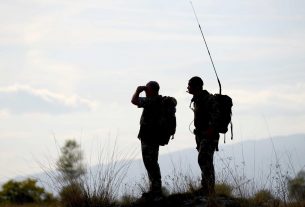Mexican President Andrés Manuel López Obrador has attributed part of the recent surge in violence in Sinaloa to actions by the United States, pointing to a wave of deadly incidents in the state. Over the past two weeks, dozens of bodies have been found on streets and highways, reflecting an alarming spike in bloodshed.
During a press conference on Thursday, López Obrador suggested that U.S. actions had aggravated tensions within the Sinaloa Cartel, leading to violent clashes. He specifically referred to the arrest of two key cartel figures in the U.S., which he believes stirred internal conflicts.
Arrest of Key Cartel Figures
The controversy stems from the recent arrest of Sinaloa Cartel co-founder Ismael “El Mayo” Zambada and Joaquín Guzmán López, son of infamous drug lord Joaquín “El Chapo” Guzmán. The two were apprehended on July 25 after landing near El Paso, Texas, on a private plane. Zambada later claimed that he was “ambushed” and “kidnapped” by Guzmán López, who then handed him over to U.S. authorities.
According to a statement released by Zambada’s attorney in August, he described a violent encounter in which he was subdued by a group of men, hooded, and taken by force. He alleged he was driven to a landing strip where he was placed on a plane bound for the U.S. The exact reasons behind Guzmán López’s decision to surrender to U.S. authorities, and why he delivered Zambada, remain unclear.
Allegations Against U.S. Justice Department
López Obrador has expressed suspicions over how the operation unfolded, claiming that the U.S. Department of Justice had “agreements” with a criminal organization that led to Zambada’s arrest. He even went as far as to describe the event as a form of kidnapping orchestrated between cartel groups, hinting at possible backroom deals.
While the U.S. Department of Justice has yet to respond to these allegations, U.S. Ambassador to Mexico, Ken Salazar, has already denied claims of American involvement in the operation. In remarks made on August 9, Salazar stated that the U.S. had no part in the operation that led to Zambada’s capture. “It was not a U.S. plane, it was not a U.S. pilot, it was not our agents or our people in Mexico. This was an operation between the cartels, where one handed over to the other,” Salazar said.
Surge in Violence and Disruption
Following the arrests, Sinaloa has seen a surge in violent confrontations, primarily between factions loyal to Zambada and those led by other sons of “El Chapo.” Since September 9, at least 49 people have been reported dead as a result of these clashes, according to local authorities.
The situation has escalated to the point where bodies with gunshot wounds have been discovered scattered across streets, highways, and other public areas. The rise in violence has forced Governor Ruben Rocha Moya to take drastic measures, including canceling Independence Day celebrations last week and temporarily suspending classes across the state.
“In Sinaloa, there wasn’t the violence that there is now,” López Obrador remarked, while acknowledging that the security situation has become increasingly precarious. Despite this, he insisted that Mexican authorities are actively working to manage the crisis, denying that the situation is entirely out of control. “We are there, but we have had to take special measures and move elements of the Armed Forces, and we have also lost officers who have been killed due to this special, extraordinary situation,” he explained.
Losses Among Mexican Security Forces
The recent wave of violence has also resulted in casualties among Mexican security forces. Defense Secretary Luis Cresencio Sandoval confirmed that at least two soldiers lost their lives during the ongoing clashes in Sinaloa last week.
López Obrador’s remarks reflect growing concerns over the ability of local and federal authorities to maintain order in Sinaloa, a state with a long history of cartel influence. While he attributed part of the issue to external factors, the Mexican president emphasized that efforts are underway to restore stability. However, the volatile environment in the region continues to highlight the challenges of combating organized crime in Mexico, particularly when intertwined with international factors.




